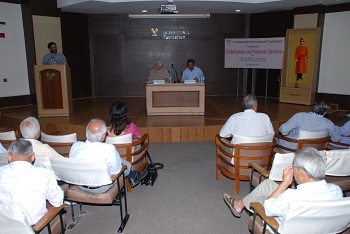Vimarsha of March 2011 saw eminent scholar of Buddhist and Cultural studies Dr. Lokesh Chandra speak on ‘Globalisation and National Identities’. While introducing the speaker, VIF Director Shri Ajit Doval observed that the selected topic was of great relevance to us – as a nation, as a civil society as well as a civilisation. He indicated the paradoxes of the times when there is plenty of information but a lack of clarity, when there is a plethora of comfort but less of happiness, there is more of speed but less of a sense of direction and finally when there are greater organisations but less of an idea of our collective identity. Discussing civilisational interactions in the ancient world where there were exchanges of ideas and identities, Shri Doval said that these exchanges, though they discovered a number of commonalities among cultures and civilisations was not part of the phenomena of globalization as it is understood today. Globalisation today, he said, has to be seen essentially as a mercantile concept, a market driven phenomena and when one talks of its impact one is essentially referring to its economic side though cultural is equally important and crucial. For him the essential challenge before collectivities today is how to retain ones’ diversity of expression and identity against the impact of this market driven process of flattening of identities. He saw this flattening of identities as cause for great concern.
In his address Dr. Lokesh Chandra focused on “globalization – a deadly cancer that is affecting the world today.” His main argument was that globalization is ushering an era of uniformity and decimating diversities of identities and expressions. Uniformity, he observed, is ultimately destructive of the beauty of human expression which thrives in variety. Arguing that every nation has a right to exist, Dr. Chandra pointed out that globalization through its ushering in a trend of uniformity was directly assaulting that the right. He indicated that this was an attempt that had been in the process for a while. Quoting various scholars he pointed out that earlier there were attempts at Europeanization of the world just as now there are efforts at Americanization of the world. He termed the phenomena of globalization as a Memory Erasing – Mind Eradicating cultural cancer gradually engulfing the world. A forced uniformity was gradually eradicating collective identities and through it their civilisational memories too. This was something that was extremely worrisome especially because of its long term and far reaching effects. He called for serious thinking on these fronts, for a re-examination of our identity traits and for the developing of fresh perspectives and actions to protect and preserve global diversities.



